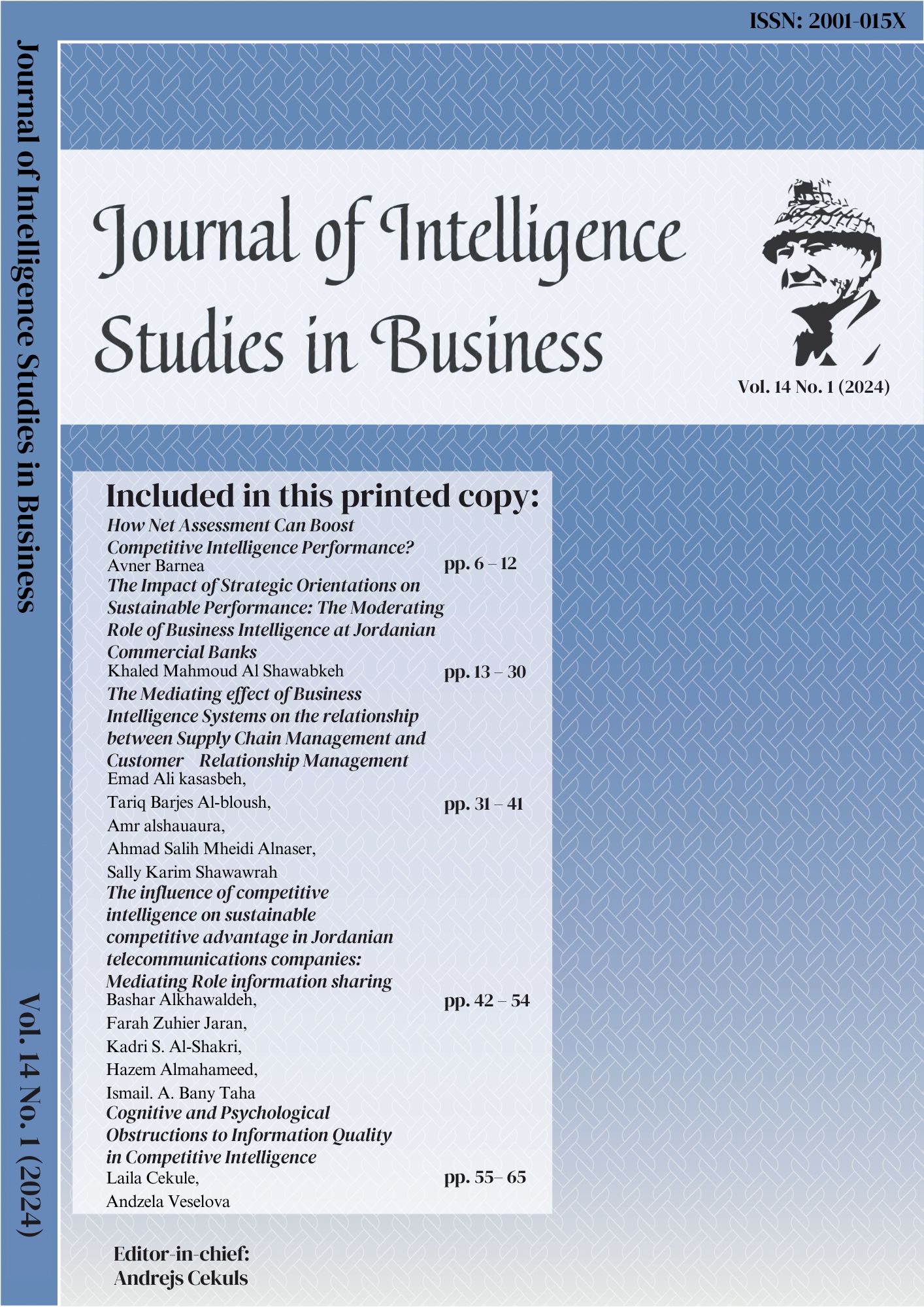The Mediating effect of Business Intelligence Systems on the relationship between Supply Chain Management and Customer Relationship Management
DOI:
https://doi.org/10.37380/jisib.v14.i1.2487Keywords:
Supply Chain Management, Customer Relationship Management, Business Intelligence SystemsAbstract
The purpose of this study is to investigate the impact of the effect of Supply Chain Management in Customer Relationship Management: The mediating role of Business Intelligence Systems. Data was collected using a survey method, the survey targeted professionals in the field of supply chain management and Business Intelligence Systems. Whereby a total of 300 questionnaires were distributed to the study sample, (270 useable questionnaires returned). Structural model assessment was conducted to test the relationships among Supply Chain Management, Business Intelligence Systems, Customer Relationship Management the results show a positive relationship between Supply Chain Management dimensions and Customer Relationship Management. Moreover, Business Intelligence Systems play a mediating role in the relationship between Supply Chain Management and the Customer Relationship Management.
References
Anshari, M., Almunawar, M. N., Lim, S. A., & Al-Mudimigh, A. (2019). Customer relationship management and big data enabled: Personalization & customization of services. Applied Computing and Informatics, 15, 94–101. DOI: https://doi.org/10.1016/j.aci.2018.05.004
Aleksandra Grabińska, & Leszek Ziora. (2019). The application of business intelligence systems in logistics. Review of selected practical examples. CzOTO, 1(1), 1028–1035. DOI: https://doi.org/10.2478/czoto-2019-0130
Baars, H., Kemper, H. G., Lasi, H., & Siegel, M. (2008). Combining RFID Technology and Business Intelligence for Supply Chain Optimization – Scenarios for Retail Logistics. In: Proceedings of the 41st Hawaii International Conference on System Sciences. DOI: https://doi.org/10.1109/HICSS.2008.93
Chatterjee, S., Mikalef, P., Khorana, S., & Kizgin, H. (2022). Assessing the Implementation of AI Integrated CRM System for B2C Relationship Management: Integrating Contingency Theory and Dynamic Capability View Theory. Information Systems Frontiers, 1–19. DOI: https://doi.org/10.1007/s10796-022-10261-w
Cheng, J., Singh, H. M., Zhang, Y.-C., & Wang, S.-Y. (2023). The impact of business intelligence, big data analytics capability, and green knowledge management on sustainability performance. Journal of Cleaner Production, 429, 139410. DOI: https://doi.org/10.1016/j.jclepro.2023.139410
Ghazian, A., Hossaini, M. H., & Farsijani, H. (2016). The Effect of Customer Relationship Management and its Significant Relationship by Customers’ Reactions in LG Company. DOI: https://doi.org/10.1016/S2212-5671(16)30014-4
Gil-Gomez, H., Guerola-Navarro, V., Oltra-Badenes, R., & Lozano-Quilis, J. A. (2020). Customer relationship management: Digital transformation and sustainable business model innovation. Economic Research Ekonomska Istraživanja, 33, 2733–2750. DOI: https://doi.org/10.1080/1331677X.2019.1676283
Hanaysha, J. R., & Al-Shaikh, M. E. (2022). An examination of customer relationship management dimensions and employee-based brand equity: A study on ride-hailing industry in Saudi Arabia. Research in Transportation Business and Management, 43, 100719. DOI: https://doi.org/10.1016/j.rtbm.2021.100719
Josiassen, A., Assaf, A. G., & Cvelbar, L. K. (2014). CRM and the bottom line: Do all CRM dimensions affect firm performance? International Journal of Hospitality Management, 36, 130–136. DOI: https://doi.org/10.1016/j.ijhm.2013.08.005
Kamalaldin, A., Linde, L., Sjödin, D., & Parida, V. (2020). Transforming provider-customer relationships in digital servitization: A relational view on digitalization. Industrial Marketing Management, 89, 306–325. DOI: https://doi.org/10.1016/j.indmarman.2020.02.004
Kaina R., Verma A. (2018). Logistics Management in Supply Chain – An overview. Materials Today: Proceedings, 5(2), 3811–3816. DOI: https://doi.org/10.1016/j.matpr.2017.11.634
Kasasbeh, E. A., Alzureikat, K. K., Alroud, S. F., & Alkasassbeh, W. A. K. (2021). The moderating effect of entrepreneurial marketing in the relationship between business intelligence systems and competitive advantage in Jordanian commercial banks. Management Science Letters, 11, 983–992. DOI: https://doi.org/10.5267/j.msl.2020.9.044
Lemon, K. N., & Verhoef, P. C. (2016). Understanding Customer Experience Throughout the Customer Journey. Journal of Marketing, 80, 69–96. DOI: https://doi.org/10.1509/jm.15.0420
Mainela, T., & Ulkuniemi, P. (2013). Personal interaction and customer relationship management in project business. Journal of Business and Industrial Marketing, 28, 103–110. DOI: https://doi.org/10.1108/08858621311295245
Martins C. L., Pato M. V. (2019). Supply chain sustainability: A tertiary literature review. Journal of cleaner production, 225, 995-1016. DOI: https://doi.org/10.1016/j.jclepro.2019.03.250
Mukhamedjanova K. A. (2020). Concept Of Supply Chain Management. Journal of critical reviews, 7(2). DOI: https://doi.org/10.31838/jcr.07.02.139
Ritter, T., & Geersbro, J. (2018). Multidexterity in customer relationship management: Managerial implications and a research agenda. Industrial Marketing Management, 69, 74–79. DOI: https://doi.org/10.1016/j.indmarman.2018.01.019
Olexova, C. (2014). Business intelligence adoption: A case study in the retail chain. WSEAS Transactions on Business and Economics, 11.
Olszak, C., & Ziemba, E. (2012). Critical Success Factors for Implementing Business Intelligence Systems in Small and Medium Enterprises on the Example of Upper Silesia, Poland. Interdisciplinary Journal of Information, Knowledge, and Management, 7. DOI: https://doi.org/10.28945/1584
Presthus, W., & Canales, C. (2015). Business Intelligence Dashboard Design. A case study of a large Logistics company. Retrieved from http://ojs.bibsys.no/index.php/Nokobit/article/view/261/225.
Sahay, B. S., & Ranjan, J. (2008). Real time business intelligence in supply chain analytics. Information Management & Computer Security, 16(1), 28–48. DOI: https://doi.org/10.1108/09685220810862733
Senthil, S., Srirangacharyulu, B., & Ramesh, A. (2012). A decision-making methodology for the selection of reverse logistics operating channels. Procedia Engineering, 38, 418–428. DOI: https://doi.org/10.1016/j.proeng.2012.06.052
Šerić, N., Rozga, A., & Luetić, A. (2014). Relationship between Business Intelligence and Supply Chain Management for Marketing Decisions. Universal Journal of Industrial and Business Management, 2(2), 31–35. DOI: https://doi.org/10.13189/ujibm.2014.020202
Tan, P. S., Lee, S. S. G., & Goh, A. E. S. (2012). Multi-criteria decision techniques for context-aware B2B collaboration in supply chains. Decision Support Systems, 52, 779–789. DOI: https://doi.org/10.1016/j.dss.2011.11.013
Trieu, V.-H. (2017). Getting value from Business Intelligence systems: A review and research agenda. Decision Support Systems, 93, 111-124. DOI: https://doi.org/10.1016/j.dss.2016.09.019
Tozin, L. J. (2022). Business Intelligence Systems in Supply Chain Management. *Corso di Laurea Magistrale in International Economics and Commerce. Università Politecnica delle Marche, Facoltà di Economia "Giorgio Fuà".
Langlois, A., & Chauvel, B. (2017). The impact of supply chain management on business intelligence. Journal of Intelligence Studies in Business, 7(2), 51–61. DOI: https://doi.org/10.37380/jisib.v7i2.239
Yeniyurt, S., Wu, F., Kim, D., et al. (2019). Information technology resources, innovativeness, and supply chain capabilities as drivers of business performance: A retrospective and future research directions. Industrial Marketing Management, 79, 46-52. DOI: https://doi.org/10.1016/j.indmarman.2019.03.008
Downloads
Published
Issue
Section
License
Copyright (c) 2024 Journal of Intelligence Studies in Business

This work is licensed under a Creative Commons Attribution-NonCommercial-NoDerivatives 4.0 International License.
Authors who publish with this journal agree to the following terms:
- Authors retain copyright and grant the journal right of first publication with the work simultaneously licensed under a Creative Commons Attribution License that allows others to share the work with an acknowledgement of the work's authorship and initial publication in this journal.
- Authors are able to enter into separate, additional contractual arrangements for the non-exclusive distribution of the journal's published version of the work (e.g., post it to an institutional repository or publish it in a book), with an acknowledgement of its initial publication in this journal.
- Authors are permitted and encouraged to post their work online (e.g., in institutional repositories or on their website) prior to and during the submission process, as it can lead to productive exchanges, as well as earlier and greater citation of published work (See The Effect of Open Access).








